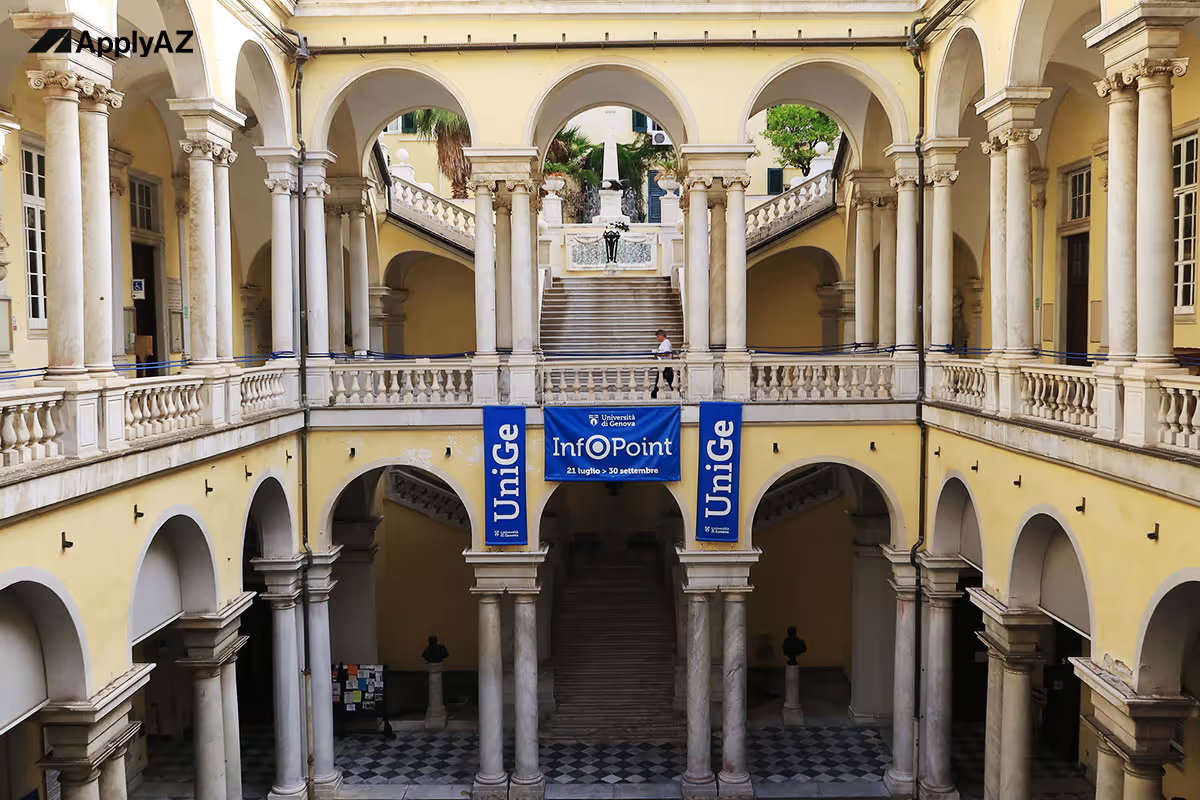Heading
Heading








University of Genoa
English‑taught programmes in Italy: why choose the University of Genoa
Founded in 1481 and consistently ranked among Europe’s leading maritime and engineering hubs, the University of Genoa offers more than 40 degree tracks taught partly or fully in English. This makes it one of the most versatile options for students seeking English‑taught programs in Italy while paying the regulated fees of public Italian universities. Incomes under specific thresholds can unlock the DSU grant, bringing total costs close to the levels often associated with tuition‑free universities Italy commentators mention. Key departments include naval architecture, robotics, computer science, biotechnology, and economics—each anchored by research centres that attract EU Horizon funding and private‑sector contracts.
Living and learning in a historic port city
Genoa stretches between mountains and sea, giving students a mild climate—winter averages 10 °C and summers hover around 28 °C. Shared flats in neighbourhoods like San Fruttuoso or Albaro cost roughly €300–€350 per month, and a €25 student travel pass covers buses, funiculars, and seaside trains. Cafeteria meals drop to €4 or even zero when the DSU grant applies. Cultural life blends Renaissance palaces, street‑art lanes, and open‑air concerts on the harbour. University sports clubs organise sailing, climbing, and coastal hikes, while language‑exchange cafés help you practise Italian after lectures.
Careers, internships, and industry links
Genoa is Europe’s busiest Mediterranean port and the core of Italy’s “Blue Economy.” Maritime giants, shipyards, and logistics groups recruit engineering and business students for roles in vessel design, supply‑chain analytics, and environmental compliance. The city also hosts the Italian Institute of Technology, famous for humanoid robots and smart materials—ideal for internships in AI, neuroscience, or nanotech. Biomedical start‑ups cluster around the university hospital, offering traineeships in gene therapy and medical imaging. Tourism and yachting sectors create seasonal part‑time jobs, useful for earning while studying. Career Services run bilingual CV workshops and link graduates to Erasmus+ traineeships across the EU.
Funding and academic support
Tuition scales from about €600 to €2 500 per year, depending on family income. Scholarships for international students in Italy include merit awards for high GPAs, fee waivers for refugee status, and lab assistantships that pay hourly. The DSU grant can waive tuition entirely, provide free meals, and contribute up to €7 000 toward rent and books—renewable when you pass 30 ECTS each year. The International Student Office helps with visa paperwork, health insurance, and accommodation lists, while the Language Centre offers free Italian courses from A1 to C1.
An inviting mix of heritage and innovation
Studying in Genoa means analysing wave mechanics in class and watching cargo ships glide past medieval city walls after hours. It means prototyping underwater drones in cutting‑edge labs, then testing them in the Ligurian Sea. Most of all, it means joining a diverse student body that values both tradition and forward‑thinking research. Choose Genoa if you want the networking ease of a medium‑sized city, the research muscle of a centuries‑old university, and cost structures that remain manageable thanks to Italy’s public‑education model and the DSU grant.
Ready for this programme?
If you qualify and we still have a spot this month, we’ll reserve your place with ApplyAZ. Our team will tailor a set of best-fit majors—including this course—and handle every form and deadline for you. One upload, many applications, guaranteed offers, DSU grant support, and visa coaching: that’s the ApplyAZ promise. Start now and secure your spot before this month’s intake fills up.
Safety Engineering for Transport, Logistics, and Production (LM‑26) at University of Genoa
Italy now hosts more than 500 English‑taught programs in Italy, and this master in Safety Engineering ranks among the most applied. You can study in Italy in English while paying the regulated fees that guide public Italian universities. Through the DSU grant and other funding, many learners reduce net costs to figures often highlighted by tuition‑free universities Italy advisers. The course equips you to analyse risk, design resilient supply chains, and manage automated production with a safety‑first mindset.
1. Safety leadership in a changing world
Passenger numbers, freight flows, and robotics adoption all surge worldwide. Each rise brings new hazards—battery fires on ferries, cyber‑attacks on smart depots, or collaborative‑robot collisions on factory floors. Businesses therefore seek engineers who blend technical rigour, regulatory insight, and management skill. This LM‑26 master delivers:
- Quantitative risk assessment across rail, road, sea, and air.
- Simulation of logistics bottlenecks and emergency scenarios.
- Integration of functional safety standards (ISO 26262, IEC 61508).
- Human‑factor methods that reduce operator error.
You graduate ready to lead cross‑disciplinary teams that keep people, assets, and the planet safe.
2. Course design and learning milestones
The curriculum covers 120 ECTS over two academic years. All lectures, labs, and assessments are in English, supporting truly international classes.
Year 1 – fundamentals
- Reliability Engineering (8 ECTS) – failure modes, fault‑tree analysis, and Weibull modelling.
- Transport System Safety (8 ECTS) – rail signalling, highway barriers, maritime traffic separation.
- Industrial Risk Assessment (6 ECTS) – HAZOP, bow‑tie diagrams, consequence modelling.
- Statistics for Safety (6 ECTS) – Monte‑Carlo, Bayesian networks, and data quality audits.
- Human Factors and Ergonomics (4 ECTS) – workload, alarms, and safety culture.
- Technical English for Engineers (2 ECTS) – concise reporting and standards vocabulary.
Year 2 – integration and innovation
- Automation and Functional Safety (8 ECTS) – PLC safety loops, SIL verification, and redundant architectures.
- Logistics and Supply‑Chain Resilience (6 ECTS) – discrete‑event simulation, stock‑out risk, and climate‑proof routing.
- Process Safety Management (6 ECTS) – Seveso directives, LOPA, and safety‑integrity budgeting.
- Cyber‑Physical Risk (4 ECTS) – threat modelling for IoT sensors, secure protocols, and incident response.
- Elective track (4 ECTS) – choose Aviation Safety, Offshore Structures, or ADR Hazardous Transport.
- Integrated Safety Project (6 ECTS) – team redesigns a chemical warehouse complete with evacuation drills and costed safety barriers.
- Professional Internship (14 ECTS) – 350 hours in ports, automotive labs, or process plants.
- Master’s Thesis (16 ECTS) – original research; recent topics include “AI‑Driven Anomaly Detection for Autonomous Trams,” and “Composite Tank Rupture Modelling under Impact.”
Each semester mixes lectures with case clinics, where you dissect real accidents, map root causes, then propose corrective and preventive actions.
3. Research facilities, digital tools, and industry bridges
Students access:
- Human‑in‑the‑loop driving simulator – test ADAS scenarios and distraction metrics.
- Logistics Digital Twin Lab – AnyLogic, FlexSim, and Python pipelines for port flow simulation.
- Process Safety Hall – small‑scale reactors, pressure‑relief rigs, and gas‑detonation tubes.
- Cyber‑security Sandbox – PLC testbeds, SCADA emulators, and intrusion‑detection honeypots.
- Materials Testing Room – impact testers and thermal cameras for battery modules.
Corporate partners such as Fincantieri, Hitachi Rail, and DHL share anonymised datasets and host plant visits. Many offer thesis co‑supervision and stipend‑backed internships.
4. Fees, DSU grant, and extra scholarships
Tuition bands
Thanks to the public policy of Italian universities, fees adjust to family income:
- Lower band: ~€900 per academic year.
- Upper band: ~€2 700 per year.
Installments spread the cost across the semester.
DSU grant
Qualifying candidates receive:
- Full tuition waiver.
- Free or low‑cost meals.
- Housing allowance or dorm room.
- Cash stipend up to €7 000 per year, renewable with 30 ECTS progress.
Additional aid
- Merit fee reduction (25 %) for GPAs ≥ 3.5/4.0.
- Women‑in‑Engineering bursary (€2 000).
- Erasmus+ grants—fund a semester at Ruhr‑University Bochum or TU Delft.
- Company fellowships—€3 000‑€5 000 tied to safety‑analytics projects.
With layered funding, many students match the low net spend that “tuition‑free universities Italy” headlines suggest, without losing high‑tech labs or global mentors.
5. Career tracks and professional certification
Roles open to graduates
- Safety engineer in automotive, shipbuilding, or rail rolling‑stock firms.
- Risk analyst at logistics hubs and third‑party freight operators.
- Process safety coordinator in chemical and pharmaceutical plants.
- Functional safety consultant auditing IEC 61508 compliance.
- PhD researcher in transport risk or human‑factor engineering.
Certifications aligned to coursework
- TÜV Functional Safety Engineer.
- IOSH Chartered Safety and Health Practitioner.
- Six Sigma Green Belt for quality‑risk projects.
- CIPS Level 4 for resilient procurement (logistics elective).
Job placement data shows 92 % employment within six months of graduation.
Ready for this programme?
If you qualify and we still have a spot this month, we’ll reserve your place with ApplyAZ. Our team will tailor a set of best-fit majors—including this course—and handle every form and deadline for you. One upload, many applications, guaranteed offers, DSU grant support, and visa coaching: that’s the ApplyAZ promise. Start now and secure your spot before this month’s intake fills up.

They Began right where you are










